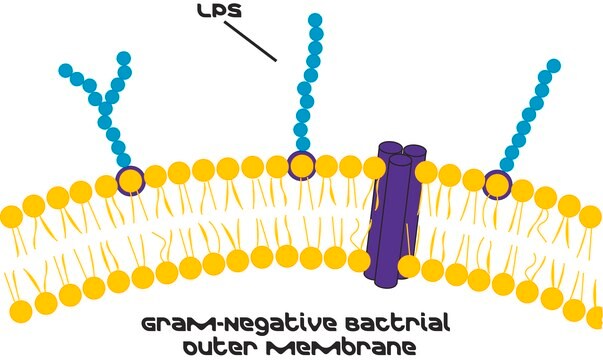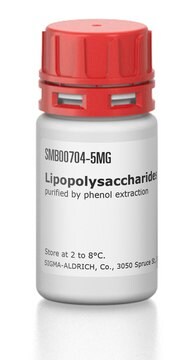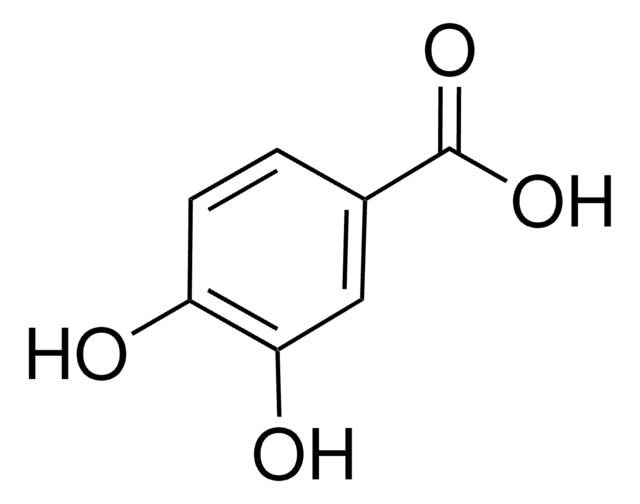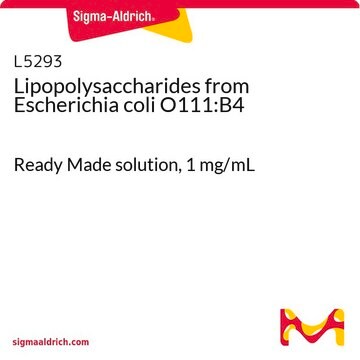추천 제품
생물학적 소스
Porphyromonas gingivalis
Quality Level
양식
powder
정제법
phenol extraction
불순물
≤3% Protein (Lowry)
색상
white to faint yellow
solubility
triethylene glycol dimethyl ether: 0.90-1.10 mg/mL to hazy, colorless to light yellow
배송 상태
ambient
저장 온도
2-8°C
일반 설명
Lipopolysaccharides (LPSs) are characteristic components of the cell wall of Gram-negative bacteria like Porphyromonas gingivalis. It differs from LPS from Escherichia coli in its structure and various functional activities.
애플리케이션
Lipopolysaccharide has been used:
- as a treatment to stimulate acute lung injury in human bronchial epithelial (HBE) cells
- as an agonist for toll-like receptor 4 (TLR4) and to stimulate intestinal normal fibroblasts (NFs) to study osteopontin (OPN) expression in myofibroblasts
- to study its effects on pro-inflammatory and pro-coagulant genes expression in endothelial cells
생화학적/생리학적 작용
LPS and its lipid A moiety stimulate cells of the innate immune system by the Toll-like receptor 4 (TLR4), a member of the Toll-like receptor protein family, which recognizes common pathogen-associated molecular patterns (PAMPs).
Additionally, it was demonstrated that the mechanisms by which LPS from E. coli and P. gingivalis modulate cluster of differentiation 14 (CD14), toll-like receptor 2 (TLR2), and toll-like receptor 4 (TLR4) surface expression, primary and secondary cytokine responses are different.
Porphyromonas gingivalis is a Gram-negative bacterium that is known to be involved in adult periodontitis. Periodontitis is a chronic inflammatory disease characterized by the recession of the supportive tissue surrounding teeth. Studies have shown that the LPS from P. gingivalis plays an important role in this disease.
A recent study demonstrated that LPS from P. gingivalis stimulates insulin secretion by the pancreatic β cell line, MIN6. In the presence of 5 mM glucose and 50-500 ng/mL LPS from P. gingivalis, a significant induction of insulin secretion was observed.
Additionally, it was demonstrated that the mechanisms by which LPS from E. coli and P. gingivalis modulate cluster of differentiation 14 (CD14), toll-like receptor 2 (TLR2), and toll-like receptor 4 (TLR4) surface expression, primary and secondary cytokine responses are different.
Porphyromonas gingivalis is a Gram-negative bacterium that is known to be involved in adult periodontitis. Periodontitis is a chronic inflammatory disease characterized by the recession of the supportive tissue surrounding teeth. Studies have shown that the LPS from P. gingivalis plays an important role in this disease.
A recent study demonstrated that LPS from P. gingivalis stimulates insulin secretion by the pancreatic β cell line, MIN6. In the presence of 5 mM glucose and 50-500 ng/mL LPS from P. gingivalis, a significant induction of insulin secretion was observed.
제조 메모
LPS from P. gingivalis is soluble in water and cell culture medium DMEM (1-5 mg/mL), yielding a clear solution.
기타 정보
To gain a comprehensive understanding of our extensive range of Lipopolysaccharides for your research, we encourage you to visit our Carbohydrates Category page.
Storage Class Code
11 - Combustible Solids
WGK
WGK 3
Flash Point (°F)
Not applicable
Flash Point (°C)
Not applicable
이미 열람한 고객
H E Barksby et al.
Clinical and experimental immunology, 156(3), 479-487 (2009-05-15)
Porphyromonas gingivalis lipopolysaccharide (LPS) (strain W50) interacts with Toll-like receptor 2 (TLR-2) leading to cytokine expression and inflammation, and thereby plays a key role in the pathogenesis of periodontal disease. The aims of this study were to investigate gene expression
Analysis of Lipopolysaccharides of Gram-Negative Bacteria
Mayer, H. et al.
Methods in Microbiology, 18, 157-207 (1985)
Differential expression of immunoregulatory genes in monocytes in response to Porphyromonas gingivalis and Escherichia coli lipopolysaccharide.
Barksby, H.E, et al.
Clinical and Experimental Immunology, 156, 479-487 (2009)
Virulence factors of Porphyromonas gingivalis.
Holt, S.C., et al.
Periodontology 2000, 20, 168-238 (1999)
Epidemiology of subgingival bacterial pathogens in periodontal disease.
Zambon, J.J., et al.
Molecular Pathogenesis of Periodontal Disease, 1-12 (1994)
자사의 과학자팀은 생명 과학, 재료 과학, 화학 합성, 크로마토그래피, 분석 및 기타 많은 영역을 포함한 모든 과학 분야에 경험이 있습니다..
고객지원팀으로 연락바랍니다.


